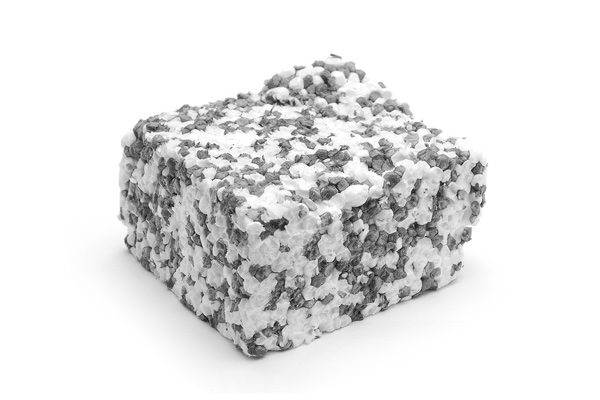EPS and fine powder coatings – a love story
7. January 2024
In 2024, expandable polystyrene (EPS) celebrates its anniversary: the 75th anniversary of its (accidental) discovery. A lot has happened since then and EPS is used in so many areas of our daily lives that it has become indispensable.
Foodstuffs such as vegetables and fish are packaged in it to keep them cool, transportable and fresh for longer. Electronics, household appliances and furniture are wrapped in it for transportation to their destination to protect them from damage. And in the construction sector, EPS is used on building facades to provide efficient thermal insulation. This is just a small selection of the possible uses. Special fields of application, such as cool boxes for vaccines (see article: How SOFTENOL® is helping to contain the pandemic), round off the versatility of this material.
Another technology that has been around for a long time is that of coating agents for EPS. For decades, powdered systems, often consisting of glycerol mono- and glycerol tristearate and zinc stearate, have been used to ensure processing into perfectly insulating and shock-absorbing finished foam. At first, this class of glycerides and metal soaps does not sound particularly spectacular. So, what is the key to success? In addition to balancing the various physicochemical properties in the formulation of such coating agents, the powder quality plays a major role: “particle size distribution” is the magic word.
If the particle size exceeds certain limits, the surface of the EPS beads is not sufficiently coated with the process-reducing layer and the performance in further processing suffers. In addition, the accumulation of loose coating agent results in increased cleaning effort. A higher degree of fineness of the powder is possible but requires greater effort and thus increases the complexity and costs and, from certain ranges on, still does not lead to an increase in the performance of the system. There is therefore a comfort range that must be perfectly tuned. The production of this constant powder quality is one of the pillars of our know-how in the field of EPS.

The Technical Applications business unit of IOI Oleo GmbH has recently started working on alternative coating agents. The aims of this development work are, for example, the simplification and thus increased sustainability of the coating agent, as well as additional application options beyond the powder form, in order to give our customers more flexibility with regard to their technical conditions on site.
Dr. Andreas Wintzer
Dr. Andreas Wintzer is Technical Product Manager in the Technical Applications Business Unit at IOI Oleo GmbH. He studied Chemistry at TU Dortmund University with an emphasis on technical chemistry, particularly in the area of renewable raw materials. The extensive knowledge he acquired during his studies is the perfect basis for his work at IOI. Before joining IOI Oleo GmbH, Andreas completed a trainee programme at the European Space Agency in the Netherlands, then gained production experience as a technologist at Papierfabrik Hagen, which at the time belonged to the Stora Enso group. He enjoys sports, regularly rides to work by bike and preferably spends his leisure time with his family or friends.

